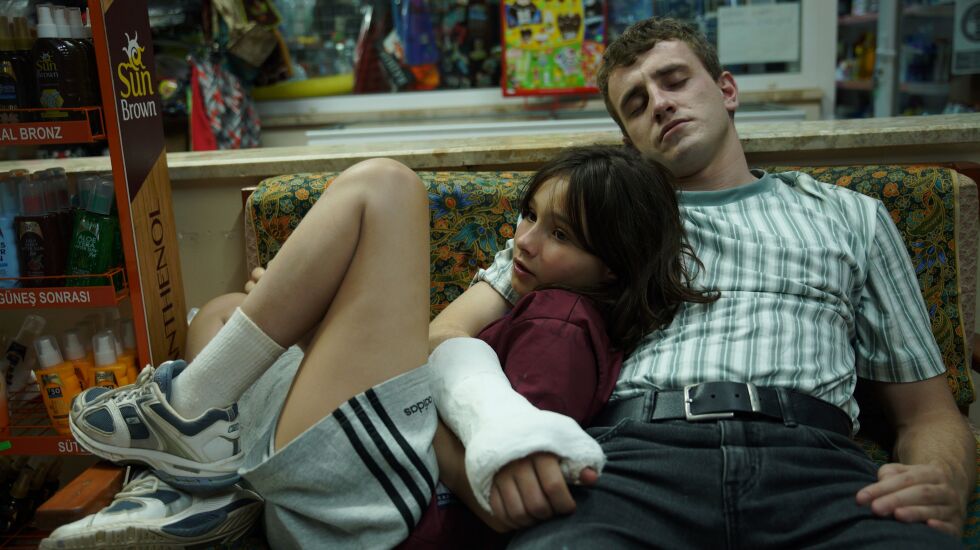
The Scottish writer-director Charlotte Wells’ minimalist masterpiece “Aftersun” draws us into the lives of a father and daughter on a summer vacation in such a natural and gradual way that we feel like we truly know them as the days and nights go by, and we care deeply about them. And yet it still comes as something of a jolt when the final moments of this movie hit us SO hard, like a sledgehammer to the heart. We will not give away what happens (or doesn’t happen) in those last scenes, other than to say it solidifies our feeling this is one of the best films of 2022.
Some movies are so artificial it feels as if nobody would ever say or do most of the things the characters say and do throughout the journey. With “Aftersun,” every moment, every snippet of dialogue, every detail down to the smallest role or the tiniest detail in the background feels like a vibrant slice of real life. From the opening scene that is filtered through the hazy, grainy lens of a camcorder (remember camcorders?) to the closing credits, this feels real — and yet somewhat dreamlike throughout, like an extended memory.
With the exception of a few flash-forwards, “Aftersun” takes place over the course of several days late in the summer of 1999, with 11-year-old Sophie (Frankie Corio) joining her father Calum (Paul Mescal) for a holiday in a downscale Turkish resort populated mostly by vacationing Brits. Sophie lives with her mother in Scotland and Calum lives in England, and it’s clear her parents have been divorced for quite some time, and Calum’s time with Sophie is limited, so they’re determined to make the most of it. (Calum also has a cast on his arm and we’re not sure what happened; let’s just say it’s not the only part of Calum that seems fractured and in need of healing.)
Director Wells and cinematographer Gregory Oke shoot the story in a casual, handheld kind of way, and there are scenes shown from the viewpoint of Sophie’s video camera, yet there’s never that irritating, overly jumpy element to the visuals. It just feels like we’re there with Calum and Sophie.
Calum is in his early 30s, and he and Sophie are sometimes mistaken for siblings — and Calum’s parenting choices reflect his young age. He’s not a bad parent; he’s just a little lax, even as he expresses concerns about Sophie making the right choices as a tween. The resort they’re staying at doesn’t have much to offer beyond a crowded pool and some cheesy late-night entertainment, and we see glimpses of Calum’s chagrin over being financially strapped, but the precocious and inquisitive and sweet Sophie couldn’t care less about such things. She’s having the time of her life: hanging out with some “cool” teenagers, staying up late with her pops, making friends with a boy her age at the arcade.
Still, Sophie is a very smart girl, and there are times when she sees (though doesn’t fully understand) that her father is not in a good place. Calum has brought along a stack of books about self-improvement and meditation, and he often practices his tai chi moves, as if he’s seeking some kind of higher truth and enlightenment, some sense of inner peace. But when we see Calum nervously smoking a cigarette on the balcony of their tiny room while Sophie sleeps inside, or when Calum refuses to join Sophie for a karaoke number and abandons her as she sings “Losing My Religion” in a voice that aches for her father to join her, to see her, to be with her, we understand Calum is in great pain. As much as he loves his daughter, as much as they both wish this holiday wouldn’t end, Calum already knows it’s probably best that he’s not in Sophie’s life every single day, and Sophie is beginning to see that as well.
“Aftersun” is peppered with neat little period-piece references; remember when “The Macarena” was a cringe-inducing thing? This makes for an even greater impact when the story rockets forward some 20 years for just a glimmer of a moment or two, when Sophie (played by Celia Rowlson-Hall in the flash-forwards) is roughly the age her father was during that vacation and has a partner and a newborn baby. (We see a few totems from that holiday in Sophie’s apartment, including one item that just kills us.) Two decades after that outwardly idyllic, sun-dappled getaway, it appears as if Sophie remembers it as one of the most beautiful and yet one of the most heartbreaking chapters in her entire life.







